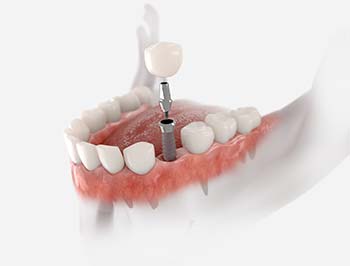
Patient Info
Dental Implants
Cosmetic Dentistry
General Dentistry
 Dental implants are the ideal way to replace missing teeth because they look, feel, and function the most like natural teeth. The surgery is fairly invasive, requiring an incision to be made in the gum and a hole to be drilled in the jawbone for the implant screw. This creates a stable base for your prosthetic teeth.Dr. Byron Scott at Springhill Dental Health Center in Mobile, AL specializes in dental implant surgery. He has been serving the residents of Mobile since 1977 and has been recognized as an authority on a variety of dental topics.
Dental implants are the ideal way to replace missing teeth because they look, feel, and function the most like natural teeth. The surgery is fairly invasive, requiring an incision to be made in the gum and a hole to be drilled in the jawbone for the implant screw. This creates a stable base for your prosthetic teeth.Dr. Byron Scott at Springhill Dental Health Center in Mobile, AL specializes in dental implant surgery. He has been serving the residents of Mobile since 1977 and has been recognized as an authority on a variety of dental topics.
In this article, we’ll explain more about pain following dental implant surgery, how to deal with it, and when you should seek treatment.
Patients are provided local anesthesia prior to the procedure. This will numb the area, so you may feel pressure, but you should not feel any pain. If you do feel pain, let someone know and we will administer more anesthesia.
Some patients have anxiety when it comes to dental procedures and may require sedation. There are several levels of sedation available based on your personal needs.
Dental implant surgery is fairly invasive, so you can expect some pain and discomfort for up to a few days after. This will be the most acute as the local anesthesia wears off and is typically localized to the implant site. You will likely be advised to go ahead and start taking a pain reliever before the anesthesia wears off to stay ahead of the pain and discomfort.
Some other symptoms that are common following dental implant surgery include:
In order to manage/reduce the pain, you will be given specific aftercare instructions, which often include:
If recovery goes as expected, the pain following dental implant surgery should be temporary. On average, pain lasts for about 3 to 5 days and most patients only need pain medications for the first 1 to 2 days. While you should gradually resume normal activities following any type of surgery, many people are able to go back to their daily routine the day after the surgery.
The jaw stiffness, swelling, and bruising may last a bit longer but should resolve in about 7 to 10 days.
If the pain worsens or lasts longer than 14 days, you should contact the dentist right away for emergency treatment. This could indicate that there is something wrong with the implant or the implant site.
 Dental implants have a very high success rate of 95%+ over the long term. However, some patients develop pain at or near the implant site months or even years following the surgery due to peri-implant diseases or implant failure.
Dental implants have a very high success rate of 95%+ over the long term. However, some patients develop pain at or near the implant site months or even years following the surgery due to peri-implant diseases or implant failure.
In addition to pain at the implant site, some of the other symptoms that are common with implant failure include:
There are several factors that can increase your risk for implant failure, including:
You may also be at an increased risk of pain near the implant if you do not practice proper oral care habits. While your replacement teeth cannot decay, they must be cared for just like your natural teeth. You must brush at least twice daily and floss at least once. You can control bacteria by using an antiseptic mouthwash when you brush. Finally, schedule regular maintenance visits with the dentist every 6 months for an exam and cleaning.
If you do not properly care for your replacement teeth, you may develop peri-implant disease. This condition can cause inflammation, leading to tissue damage and jawbone loss- which can ultimately lead to implant failure. If it is only the soft tissue that is affected, you may be able to reverse it. However, once it affects the jawbone, you may need reconstructive surgery.
There is a 5% or less chance that your implant will fail. However, if this happens, the implant will need to be removed. In some cases, a new implant can be placed right away but if the damage is too great, you may need to explore other tooth replacement options.
 If you are missing one or more teeth, schedule your dental implant consultation with Dr. Scott at Springhill Dental Health Center today. He has been treating patients in the Mobile area since 1977. He cares about his patients and is happy to address any questions or concerns you may have at any time.
If you are missing one or more teeth, schedule your dental implant consultation with Dr. Scott at Springhill Dental Health Center today. He has been treating patients in the Mobile area since 1977. He cares about his patients and is happy to address any questions or concerns you may have at any time.
If you already have dental implants, he can help you maintain them with regular visits every 6 months. He will monitor your oral health and check for any indications that you are experiencing implant failure.
If you do have extreme pain and sensitivity or other indications of implant failure, contact the office right away for emergency treatment. It’s important to address the problem as quickly as possible to avoid additional complications.
My visit was incredible. I had my “All on Four” appliances cleaned, and it was a painless and thorough experience. Dr. Scott and all his staff are very friendly. During the cleaning, Mary was gentle and let me know everything she was doing and how it would feel. She gave me tips on how to clean my implants/appliances better and gave me a small brush to do the underside more effectively. Dr. Scott and Mary suggest cleanings take place every 3 months so I will be back in December.

Dr. Byron Scott is a highly-trained and accomplished dentist. He attended The University of Alabama School of Dentistry and subsequently completed numerous Advanced Studies and Trainings. Dr. Scott is Board-Certified by The Academy of General Dentistry and has earned Mastership status (MAGD), an honor shared by only 1% of dentists. He has numerous memberships and associations, including Diplomate status with The American Board of Oral Implantology (D-ABOI) and The International Congress of Oral Implantologists (D-ICOI). Overall, Dr. Scott has dedicated his life and career to helping patients improve their oral health through expert dentistry. His goal is to help each patient keep their smile healthy, attractive, and comfortable for the duration of their lifetime.
